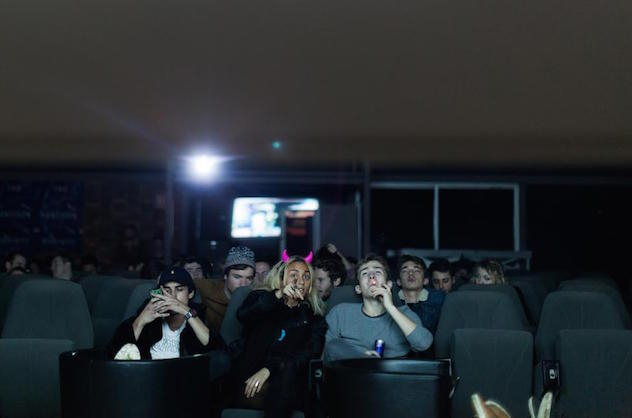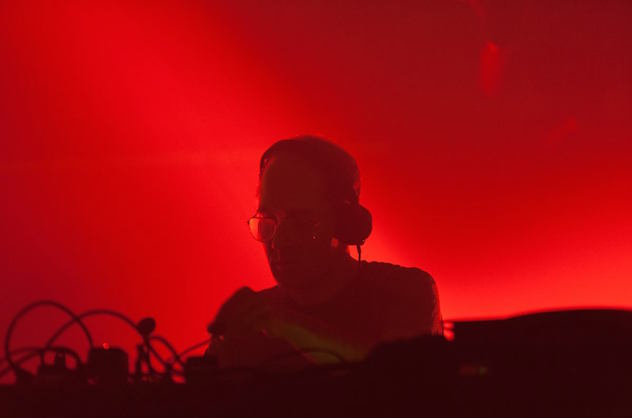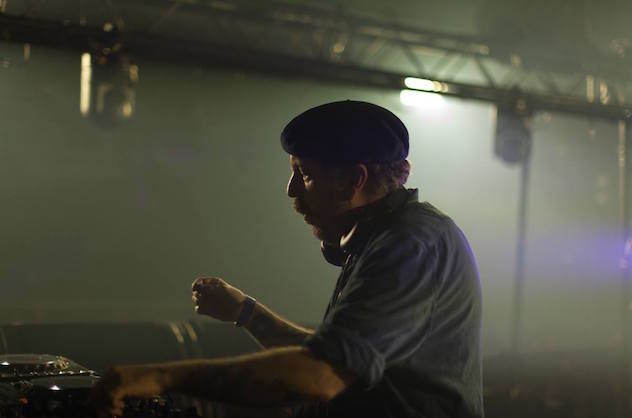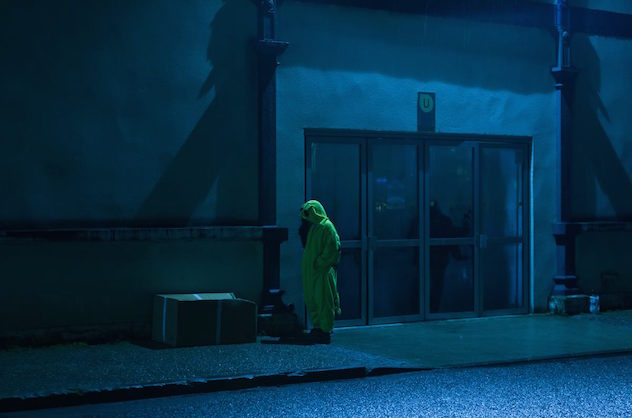- As recently as a few years ago, electronic music festivals in Paris were only held during the summer. This way, organisers could guarantee maximum attendances by relying on the benefits that come with partying in the open-air. These days, though, the resurge of warehouse parties in France has pushed promoters to reconsider this approach, developing winter counterparts to their sun-drenched flagships. On Saturday, January 30th, The Peacock Society returned to its original setting for its winter debut, taking over a stretch of the lovely Parc Floral in the vast Bois Des Vincennes.
A festival cannot be judged solely on its lineup and soundsystems. In order to stand out from the pile and assert its identity, the organisers must look beyond the typical raving experience. In The Peacock Society's case, extra-musical entertainment arrived in the form of Ciné-Club, a roomy atrium that hosted screenings of music-related documentaries along with other visual oddities. Watching Jozef Deville's The Sound Of Belgium was a pleasant way to ease into the festival, and overall the Ciné-Club sat as a neat alternative to the traditional chill-out areas.
 The festival's lineup was spread across three stages. On the outskirts of Parc Floral, an intimate space called The Night-Club hosted techno acts like Matrixxman and Rrose, but was let down by underwhelming sound. Most of the action was divided between the two main stages, Squarehouse and the arena-sized Warehouse. A number of local acts performed across the evening, with Etienne Jaumet's Zombie Zombie stealing the show in Warehouse. At Squarehouse, Detroit's Luke Hess entranced the crowd with a live set of deep, hypnotic techno, his subtle electronics teasing and priming the rapidly-filling hall for what was to come.
By 1 AM, the crowd had thickened considerably. Performing as Daphni, Dan Snaith was greeted with thunderous cheers as he took his place onstage. He delivered a strong performance, blending cheerful grooves like Milton Wright's epic "Brothers And Sisters" with some of his own house bangers. His set climaxed with an extended version of Caribou's "Sun," which sounded fresher than ever on Warehouse's massive system. The venue's layout had been carefully considered, and the flickering lights and lasers made the experience particularly dreamy. At 2:30 AM, I made my way back to Squarehouse for Motor City Drum Ensemble. His set was easily one of the night's highlights, culminating in Liem's deep house gem "If Only."
The festival's lineup was spread across three stages. On the outskirts of Parc Floral, an intimate space called The Night-Club hosted techno acts like Matrixxman and Rrose, but was let down by underwhelming sound. Most of the action was divided between the two main stages, Squarehouse and the arena-sized Warehouse. A number of local acts performed across the evening, with Etienne Jaumet's Zombie Zombie stealing the show in Warehouse. At Squarehouse, Detroit's Luke Hess entranced the crowd with a live set of deep, hypnotic techno, his subtle electronics teasing and priming the rapidly-filling hall for what was to come.
By 1 AM, the crowd had thickened considerably. Performing as Daphni, Dan Snaith was greeted with thunderous cheers as he took his place onstage. He delivered a strong performance, blending cheerful grooves like Milton Wright's epic "Brothers And Sisters" with some of his own house bangers. His set climaxed with an extended version of Caribou's "Sun," which sounded fresher than ever on Warehouse's massive system. The venue's layout had been carefully considered, and the flickering lights and lasers made the experience particularly dreamy. At 2:30 AM, I made my way back to Squarehouse for Motor City Drum Ensemble. His set was easily one of the night's highlights, culminating in Liem's deep house gem "If Only."
 An all-star cast presided over the final three hours, though the scheduling felt arbitrary. Clouds followed Motor City Drum Ensemble with a live set of heavy techno, which, exhilarating though it was, clashed with the light-hearted tunes that had come before. Looking for something more melodic, I switched to the Warehouse for DJ Koze. But his set was disappointing, sounding more conventional than usual and completely lacking in oddball selections. (That said, when he dropped "XTC" the crowd almost melted with bliss.)
An all-star cast presided over the final three hours, though the scheduling felt arbitrary. Clouds followed Motor City Drum Ensemble with a live set of heavy techno, which, exhilarating though it was, clashed with the light-hearted tunes that had come before. Looking for something more melodic, I switched to the Warehouse for DJ Koze. But his set was disappointing, sounding more conventional than usual and completely lacking in oddball selections. (That said, when he dropped "XTC" the crowd almost melted with bliss.)
 Andrew Weatherall and Theo Parrish were tasked with closing out the two larger stages. Weatherall delivered a bass-heavy set that felt both gloomy and nostalgic, while the Parrish galvanised his crowd with a mix of heady house and killer, underrated disco edits like Brown Brothers' "Disco Kings And Queens." Both sets were strong, but Parrish's performance, like Koze's before his, occasionally felt too predictable.
Despite an impressive lineup, there was little musical coherence across The Peacock Society's 11 hours. Whether because of the sometimes awkward programming or the relatively short sets, it felt like none of the acts were leaving their comfort zones. I still had a good time, buoyed by two outstanding sets from MCDE and Daphni, but there is progress to be made if Peacock Society is to compete in what is an increasingly crowded Parisian market.
Andrew Weatherall and Theo Parrish were tasked with closing out the two larger stages. Weatherall delivered a bass-heavy set that felt both gloomy and nostalgic, while the Parrish galvanised his crowd with a mix of heady house and killer, underrated disco edits like Brown Brothers' "Disco Kings And Queens." Both sets were strong, but Parrish's performance, like Koze's before his, occasionally felt too predictable.
Despite an impressive lineup, there was little musical coherence across The Peacock Society's 11 hours. Whether because of the sometimes awkward programming or the relatively short sets, it felt like none of the acts were leaving their comfort zones. I still had a good time, buoyed by two outstanding sets from MCDE and Daphni, but there is progress to be made if Peacock Society is to compete in what is an increasingly crowded Parisian market.
 Photo credit: Yulya Shadrinsky
Photo credit: Yulya Shadrinsky
 The festival's lineup was spread across three stages. On the outskirts of Parc Floral, an intimate space called The Night-Club hosted techno acts like Matrixxman and Rrose, but was let down by underwhelming sound. Most of the action was divided between the two main stages, Squarehouse and the arena-sized Warehouse. A number of local acts performed across the evening, with Etienne Jaumet's Zombie Zombie stealing the show in Warehouse. At Squarehouse, Detroit's Luke Hess entranced the crowd with a live set of deep, hypnotic techno, his subtle electronics teasing and priming the rapidly-filling hall for what was to come.
By 1 AM, the crowd had thickened considerably. Performing as Daphni, Dan Snaith was greeted with thunderous cheers as he took his place onstage. He delivered a strong performance, blending cheerful grooves like Milton Wright's epic "Brothers And Sisters" with some of his own house bangers. His set climaxed with an extended version of Caribou's "Sun," which sounded fresher than ever on Warehouse's massive system. The venue's layout had been carefully considered, and the flickering lights and lasers made the experience particularly dreamy. At 2:30 AM, I made my way back to Squarehouse for Motor City Drum Ensemble. His set was easily one of the night's highlights, culminating in Liem's deep house gem "If Only."
The festival's lineup was spread across three stages. On the outskirts of Parc Floral, an intimate space called The Night-Club hosted techno acts like Matrixxman and Rrose, but was let down by underwhelming sound. Most of the action was divided between the two main stages, Squarehouse and the arena-sized Warehouse. A number of local acts performed across the evening, with Etienne Jaumet's Zombie Zombie stealing the show in Warehouse. At Squarehouse, Detroit's Luke Hess entranced the crowd with a live set of deep, hypnotic techno, his subtle electronics teasing and priming the rapidly-filling hall for what was to come.
By 1 AM, the crowd had thickened considerably. Performing as Daphni, Dan Snaith was greeted with thunderous cheers as he took his place onstage. He delivered a strong performance, blending cheerful grooves like Milton Wright's epic "Brothers And Sisters" with some of his own house bangers. His set climaxed with an extended version of Caribou's "Sun," which sounded fresher than ever on Warehouse's massive system. The venue's layout had been carefully considered, and the flickering lights and lasers made the experience particularly dreamy. At 2:30 AM, I made my way back to Squarehouse for Motor City Drum Ensemble. His set was easily one of the night's highlights, culminating in Liem's deep house gem "If Only."
 An all-star cast presided over the final three hours, though the scheduling felt arbitrary. Clouds followed Motor City Drum Ensemble with a live set of heavy techno, which, exhilarating though it was, clashed with the light-hearted tunes that had come before. Looking for something more melodic, I switched to the Warehouse for DJ Koze. But his set was disappointing, sounding more conventional than usual and completely lacking in oddball selections. (That said, when he dropped "XTC" the crowd almost melted with bliss.)
An all-star cast presided over the final three hours, though the scheduling felt arbitrary. Clouds followed Motor City Drum Ensemble with a live set of heavy techno, which, exhilarating though it was, clashed with the light-hearted tunes that had come before. Looking for something more melodic, I switched to the Warehouse for DJ Koze. But his set was disappointing, sounding more conventional than usual and completely lacking in oddball selections. (That said, when he dropped "XTC" the crowd almost melted with bliss.)
 Andrew Weatherall and Theo Parrish were tasked with closing out the two larger stages. Weatherall delivered a bass-heavy set that felt both gloomy and nostalgic, while the Parrish galvanised his crowd with a mix of heady house and killer, underrated disco edits like Brown Brothers' "Disco Kings And Queens." Both sets were strong, but Parrish's performance, like Koze's before his, occasionally felt too predictable.
Despite an impressive lineup, there was little musical coherence across The Peacock Society's 11 hours. Whether because of the sometimes awkward programming or the relatively short sets, it felt like none of the acts were leaving their comfort zones. I still had a good time, buoyed by two outstanding sets from MCDE and Daphni, but there is progress to be made if Peacock Society is to compete in what is an increasingly crowded Parisian market.
Andrew Weatherall and Theo Parrish were tasked with closing out the two larger stages. Weatherall delivered a bass-heavy set that felt both gloomy and nostalgic, while the Parrish galvanised his crowd with a mix of heady house and killer, underrated disco edits like Brown Brothers' "Disco Kings And Queens." Both sets were strong, but Parrish's performance, like Koze's before his, occasionally felt too predictable.
Despite an impressive lineup, there was little musical coherence across The Peacock Society's 11 hours. Whether because of the sometimes awkward programming or the relatively short sets, it felt like none of the acts were leaving their comfort zones. I still had a good time, buoyed by two outstanding sets from MCDE and Daphni, but there is progress to be made if Peacock Society is to compete in what is an increasingly crowded Parisian market.
 Photo credit: Yulya Shadrinsky
Photo credit: Yulya Shadrinsky